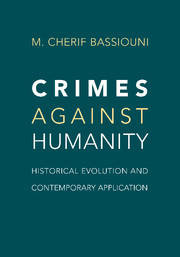Book contents
- Frontmatter
- Contents
- Preface
- Acknowledgments
- Table of Abbreviations
- Introduction
- 1 Legal Nature
- 2 Phenomenological Considerations
- 3 Emergence in Positive International Law
- 4 Post-Charter Developments
- 5 The Principles of Legality in the London Charter and Post-Charter Developments
- 6 Specific Contents
- 7 The Theories and Elements of Criminal Responsibility
- 8 Defenses and Exonerations
- 9 A Survey of National Legislation and Prosecutions for Crimes Against Humanity
- 10 Concluding Assessment: The Need for an International Convention
- Table of Authorities
- Table of Cases
- Index
- References
1 - Legal Nature
Published online by Cambridge University Press: 05 July 2011
- Frontmatter
- Contents
- Preface
- Acknowledgments
- Table of Abbreviations
- Introduction
- 1 Legal Nature
- 2 Phenomenological Considerations
- 3 Emergence in Positive International Law
- 4 Post-Charter Developments
- 5 The Principles of Legality in the London Charter and Post-Charter Developments
- 6 Specific Contents
- 7 The Theories and Elements of Criminal Responsibility
- 8 Defenses and Exonerations
- 9 A Survey of National Legislation and Prosecutions for Crimes Against Humanity
- 10 Concluding Assessment: The Need for an International Convention
- Table of Authorities
- Table of Cases
- Index
- References
Summary
Notwithstanding the marvelous accomplishments of human genius, the veneer of human civilization remains thin. Scratch its surface, and atavism appears. History demonstrates that all it takes for human atrocities is for a few to initiate the trickle down effect, and for the many to remain passive.
M. Cherif BassiouniIntroduction
The past century witnessed more people killed in various types of conflicts and regime victimization than has ever occurred at any other point in the history of mankind. Most of the victimization falls within the meaning of crimes against humanity (CAH).
The origin of the term “crimes against humanity” can be traced back to a joint declaration of the French, British, and Russian governments, dated May 24, 1915, that addressed the World War I-era crimes committed by the Ottoman Empire against its Armenian population. An estimated twenty million people were killed in World War I. Most of the casualties were combatants, and civilian deaths, for the most part, were unintended consequences of war. The situation in Turkey stood out, as it was a massacre of an estimated 200,000 to 800,000 Armenian civilians. The declaration proclaimed that “[i]n the presence of these new crimes of Turkey against humanity and civilization, the allied Governments publicly inform the Sublime Porte that they will hold personally responsible for the said crimes all members of the Ottoman Government as well as those of its agents who are found to be involved in such massacres.
- Type
- Chapter
- Information
- Crimes against HumanityHistorical Evolution and Contemporary Application, pp. 1 - 50Publisher: Cambridge University PressPrint publication year: 2011



